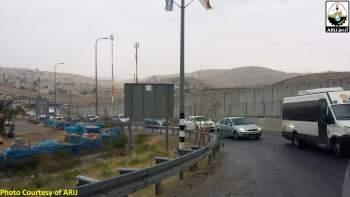For the past two weeks, the Israeli occupation army and police imposed siege on the town of Hizma north of Jerusalem city and introduced new checkpoints at Hizma’s major road paralyzing the life of Palestinians living in this community and impeding Palestinian travel. To the Palestinians of Hizma town, this Israeli closure policy represents a kind of collective punishment as it controls the daily life and movement of more than 7,000[1] Palestinians living in it.
The Israeli occupation forces erected three checkpoints/barriers at the town’s major road entrance and exit. The two checkpoints were erected following the injury of an Israeli officer claimed to have sustained serious injury which checking a “suspicious object”[2] found on the Israeli bypass road No. 60 near Pisgat Zeev settlement in occupied East Jerusalem (entrance of Hizma town) and has blown up momently.
The first checkpoint/barrier was erected near Hizma’s entrance roundabout. Israeli soldiers blocked the road with large cement blocs and barbed wires and prevented Palestinians in Hizma town and others[3] from using the road to go to Ramallah city and the northern West Bank Governorate (and vice versa); thus forcing Palestinian residents to take another road to the west, up towards Hizma military checkpoint, passing by a second roundabout that was erected in the last few years allegedly for easting traffic jams in the area.
Photo 1: Hizma’s entrance roundabout closed with cement blocks and barbed wires
Photos 2-6: a long queue of Palestinian cars waiting to pass
A second checkpoint was erected at the endpoint of Hizma main road where Israeli soldiers manning the checkpoint stop Palestinian vehicles, check ID cardds, and passengers’ have to wait long time, causing a traffic jam on the road, before the soldier wave with his hand for them to pass. A third checkpoint was erected at the town's southern entrance/exit and controls the movement of residents into and outo Hizma town. See Map 1
Map 1: Illustration of the Israeli closure imposed on Hizma town north of Jerusalem
"Erection of three Israeli checkpoints"
Hizma Town at a glance
Hizma, a Palestinian town, geographically adjacent to the settlements of Pisgat Ze'ev and Neve Yacov from the West and northwest respectively, Geva’ Benyamin (Adam) settlement from the north and Almon (Anatot) settlement from the east, Anata and an Israeli military base from the south.
Hizma town is separated from the aforementioned settlements by the Israeli segregation Wall, where movement of Palestinian into and out of the town is controlled by a crossing border passage (identified among locals as Hizma Border Passage). Only Palestinians with passing permits or those who hold Jerusalem ID cards can enter the city of Jerusalem through Hizma passage (and vice versa), while Israelis coming from nearby settlements and heading towards Jerusalem and Israel (and vice versa) can easily cross the passage; For more information about the impact of the Israeli occupation On Hizma town, see Hizma village Profile: (Page 16). See Map 2
Map 2: Hizma town and the Israeli settlements surrounding it
To conclude,
Israel’s closure policy and the erection of checkpoints are often used as means of enforcing collective punishment on the inhabitants of a certain village/town/city, or even the entire population in the occupied Palestinian territory.
Israeli checkpoints violate a wide array of international human rights principles such as “the right to freedom of movement”, “the right to healthcare”, “the right to education”, “the right to religious freedom”, “the right to work”, “the right to food and water”, “the right to freedom from collective punishment”, and other basic human rights. These rights are covered under various international treaties and covenants.
(1) Freedom of Movement is protected by Article 12 of the International Covenant on Civil and Political Rights (ICCPR), which states: 'Everyone lawfully within the territory of a State shall, within that territory, have the right to liberty of movement and freedom to choose his residence.' Article 3 of the Fourth Geneva Convention of 1949 also strictly prohibits the occupying power from initiating 'violence to life and person' and 'outrages upon personal dignity, in particular humiliating and degrading treatment'.
(2) The right of access to healthcare is protected by Article 12 of the International Covenant on Economic, Social and Cultural Rights (ICESCR); (3) the right to education is protected under Article 12 of the ICESCR and Article 26 of the Universal Declaration of Human Rights (UDHR); (4) the right to freedom of religion is protected under Article 18 of the ICCPR; (5) the right to work is protected under Article 6 of the ICESCR; (6) the right to food and water is protected under Article 11 of the ICESCR and Article 26 of the UDHR; and other rights also fall under various aspects of human rights law.
[1] Localities in Jerusalem Governorate by Type of Locality and Population Estimates, 2007-2016
http://www.pcbs.gov.ps/Portals/_Rainbow/Documents/jerus.htm
[2] as such claimed
[3] Coming from the southern West Bank Governorates and heading to Ramallah, Jericho and the northern West Bank Governorates.
Prepared By
The Applied Research Institute – Jerusalem
ARIJ






















